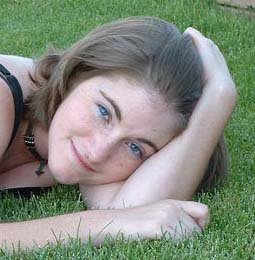Is he...?
Thank goodness this semester is almost over! I just got done studying for my first exam tomorrow. The class is called Exceptional Learners in the Classroom. The class covers things like learning disorders, mental retardation, traumatic brain injury, gifted and talented, and then some.
I was reviewing the information on gifted and talented students and I started thinking about my brother Michael. Michael is very smart, I mean I have always thought so not only as his sister but as a person who has always wanted to be a teacher. I would love to read his stories he wrote for class and even his rough drafts he would have to take home. He has always been interested in science; creating strange mixtures of beverages in his bedroom that one exploded do to heat and smelled up the whole house. I always wondered what he was thinking about when he sat in the middle of the livingroom floor meditating... Perhaps it was the meaning of life or something and maybe he found it.
It would be very sad if he was undiagnosed. He struggled in school. Sadly I think only a few good teachers recognized his full potential.
A lot of children are underdiagnosed or misdiagnosed who are gifted or talented. They are misunderstood by family, peers and teachers. I think you would have to know Michael to know what I am saying. Here is some of the research I looked at that made me think of my brother.
Contrary to popular belief, gifted, talented, and creative children face many challenges.
One challenge is being correctly identified as gifted. The other is living in a world where their personal traits are often poorly understood.
Such challenges put gifted and talented children at risk for having certain difficulties at home and school. To make matters worse, giftedness is often misdiagnosed or overlooked by psychologists, psychiatrists, and other health care professionals.
What it Means to be Gifted or Talented
According to the Institute for the Study of Advanced Development in Denver, Colorado, gifted and talented children possess greater than average awareness, perception, and sensitivity. This may be expressed in one or more areas, such as art, music, language, science, or math. Common traits of gifted and talented children include:
Creativity and strong imagination
Perfectionism and idealism
Intensity
Strong absorption in their interests
Complexity and intense inner turmoil
Deep compassion for others
Questioning established rules, beliefs, traditions, and authority
High sensitivity
Keen observation, perception, and insight
Ability to process information at deeper levels
Love of learning
Difficulties Facing Gifted and Talented Children
Because of their finely tuned awareness, gifted and talented children tend to experience life differently and more intensely than others. Unfortunately, peers and authorities at school or home often do not understand these differences. Gifted and talented children may experience the following problems:
Boredom and impatience
Frustration and disappointment when ideals are not reached
Disregard for, or open questioning of, rules and traditions
Preoccupation with deep human concerns, sometimes leading to anxiety and depression
Difficulty observing boundaries and channeling their intense energy
Not "fitting in" with their peers
In a clinical situation, the child's intense personal traits and difficulties may be viewed as symptoms of a mental or emotional disorder. Misguided therapy or medication may follow, as the clinician attempts to suppress or "cure" the symptoms of giftedness.
Common Misdiagnoses
In a paper presented at the American Psychological Association's Annual Convention in August 2000, James Webb, Ph.D. discussed common misdiagnoses of gifted children. They include:
Attention Deficit Hyperactivity Disorder (ADHD)
Traits such as intensity, impatience, sensitivity, and high energy are common in children with ADHD, as well as in gifted children. Some gifted children do have ADHD, but many do not. They are at a different developmental level than other children. As a result, they may be inattentive and impulsive in certain situations.
There is more to this particular article at:
http://www.thirdage.com/healthgate/files/14303.html



1 Comments:
YES, Michael is gifted there is no doubt about it. I have always known this and like you said a few teachers got it. Others didn't, but when he was tested he was put in the superior category of gifted and talented.
So when a mother would smile at me and say her child was gifted and talented . . . I knew her child was smart but not gifted and talented ~ or else she wouldn't be smiling.
Gifted and talented children are hard to raise and take a lot of energy. Michael did and two days after he started kindergarten I had to pick him up at the principal's office. Michael wouldn't color a hippo. When I asked him why he wouldn't? Michael said he didn't see where this hippo had any significance in his life. Those are the exact words he used.
So we took the hippo home for him to color and he colored it rainbow colors. When I asked him, aren't hippos gray? he said yes, but that is what they are expecting me to do.
So on back to school night in the kindergarten room they had hanging all these hippos. They were all grey or pink all but one which was colored with all different colors. So Michael's hippo stood out. The other the kids didn't stay in the lines very well. But Michael's may have been rainbow but he stayed in the lines. So that was just the beginning of headaches with the school.
I learned that parents who have gifted and talented children aren't smiling most of the time. That don't say those words proudly if their child is really gifted and talented. It really makes life hard for that child. I ached because it was so hard for him at times to fit in.
Post a Comment
<< Home